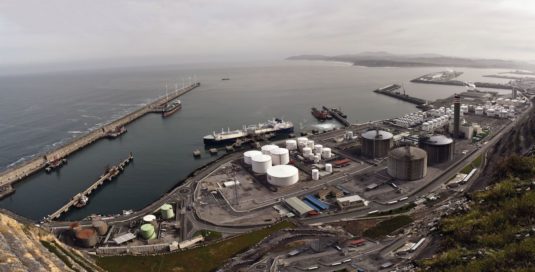The Port will be the site of a synthetic fuels production plant and will operate as a hydrogen logistics hub
Over the next few years, the Port of Bilbao will become the nerve centre of the Basque Hydrogen Corridor (BH2C), an initiative that has already engaged some 78 companies, public institutions and technology and training centres around the technological development and industrial production of hydrogen as the fuel of the future. BH2C is a project of a markedly strategic nature, global in scope and a world reference, linked to innovation and environmental sustainability, and which will contribute to the reduction of CO₂ emissions and the development of the hydrogen economy, with the Port of Bilbao at its core.
This firm commitment by the Basque energy and logistics sector to spearhead the production of green hydrogen is driven by Petronor, together with its main shareholder, Repsol, and has the support of the Basque Government through the Basque Energy Agency (EVE), the Provincial Council of Bizkaia and the Bilbao City Council. Forecast investment in 34 BH2C-related projects is estimated at EUR 1.3 billion, creating around 1,340 direct and 6,400 indirect jobs and providing a major boost to economic recovery based on a sustainable energy source that is vital in the fight against climate change.
The Port Authority of Bilbao and its port community are active players in the Basque Hydrogen Corridor. Petronor will build one of the world’s largest green hydrogen-powered synthetic fuel production plants on the 46,700 m² plot at Punta Sollana. The only raw materials used to produce these fuels are water and

CO₂, and the fuels can be used in car, lorry and aircraft combustion engines, as well as in other applications.
First phase investment will amount to EUR 67 million, with the plant expected to be operational from 2024. Subsequently, the second and third phases of the project, to be taken forward on sites parallel to the first phase, will involve an additional investment of EUR 76 million, and will consist of the construction of a 10 MW capacity gas generation plant powered by urban waste such as paper, cardboard, plastic and textiles, thereby avoiding the use of traditional fuels and promoting the circular economy. Initially, this pyrolysis plant will be able to process around 10,000 tonnes of municipal waste per year, a figure that could rise to 100,000 tonnes in later phases. This gas will be used as fuel for the refinery itself.
This Petronor project is intrinsically linked to innovation, cutting-edge technology, sustainability, decarbonisation and the energy transition, all of which contribute to reducing the carbon footprint and are aligned to the Port Authority’s own strategy of making the Port of Bilbao a centre of sustainability and innovation.

 Port access
Port access